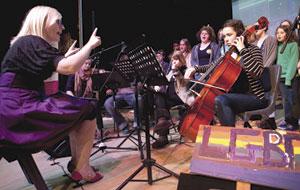Max Dineley grips the microphone with a trembling hand and begins to rap. The 13-year-old is barely audible over the band behind him, but the crowd of some 350 students and parents at Stoke Newington School in London, England, starts to clap along anyway. That’s when Max finds his voice.
“Who cares if boys are more than just friends, so let this world make amends . . . this is all about love, try to send yourself above!”
The roof, to borrow a phrase, is on fire. Next up: a group of mousy tweens who shuffle onstage to present the story of Alan Turing, the computing legend and war hero who was chemically castrated by the British government after being prosecuted for homosexuality.
This is what the UK’s LGBT History Month looks like. This, and a whole lot more. Only eight years after its launch, the initiative numbers more than 1,000 events annually — so many that organizers have given up keeping track. It was celebrated at 10 Downing St under former Prime Minister Gordon Brown. And it’s a mainstay on school curricula across Britain.
“My fantasy was that if I could create the space and give the month some status and legitimacy, then people would do events,” says LGBT History Month co-founder Sue Sanders. The plan worked.
It’s a different story across the pond, where Canadian Queer History Month — that’s a working title — looks like a group of 20-odd activists, academics and community members meeting every few weeks at a community centre in Toronto’s gay village to plan a website and settle on a name. They met for the first time in January to continue a conversation they’d been having on Twitter about how to make life better for queer youth.
“A little learning is never a bad thing,” says Casey Oraa, the group’s coordinator and the vice-chair of Queer Ontario.
Eventually, the group would like to see a curriculum that doesn’t relegate conversations about sexuality to the blushing context of sex ed. At that point, maybe projects like Canadian Queer History Month won’t be necessary, says Oraa. But first there are more urgent matters to discuss.
The first Canadian Queer History Month is scheduled for May, a month chosen to avoid trespassing on preexisting initiatives and because “it’ll be a nice way to ease into Pride,” Oraa says. The plan this year is to produce an interactive online calendar, also downloadable, that highlights Canadian queer and trans issues and historic figures and events. Choosing those issues, figures and events is the next step.
To that end, the group hosted its first town hall at Toronto’s 519 Church St Community Centre on March 4.
There are no plans to formalize Queer History Month by partnering with school boards or ministries of education — not yet, anyway — but Oraa isn’t ruling it out. In the meantime, he says, “we will be strongly encouraging our communities to do their own events and panels during the month and make the most of the month. We aren’t pioneering this to take ownership of history or communities and say, ‘Do it our way.’”
It’s a stance Sanders understands well. “The whole point [of LGBT History Month in the UK] is to cede control of the month to anyone who might be inclined to use it,” she says.
The result this year is a lecture on queer theory in Birmingham; a lesbian, gay, bisexual and trans cinema night in Belfast; and an exhibition about homosexuality in Celtic mythology in Cardiff. But the focal point of the month will always be schools.
Elly Barnes is Max’s music teacher, the woman who made it cool for 13-year-olds to rap about queer rights. For this distinction and others, Barnes was awarded the top spot on The Independent newspaper’s well-publicized Pink List, an annual ranking of “heroes and heroines who make life as a lesbian, gay, bisexual or transgender person better.” She’s also been name-dropped by Sir Elton John on national TV.
“It helped me set a new culture,” says Barnes, who helped define LGBT History Month’s potential. “We’ve pretty much eradicated homophobia and homophobic language in the school. In my own year group I had eight students that came out as LGB.”
Next stop, with Max’s help: rap music.

 Why you can trust Xtra
Why you can trust Xtra


